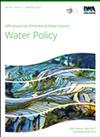Integrating wastewater reuse into water management schemes of Caribbean SIDS: a Trinidad and Tobago case study
IF 1.8
4区 环境科学与生态学
Q4 WATER RESOURCES
引用次数: 0
Abstract
Integrating wastewater reuse (WWRU) into national water management schemes (WMS) is crucial as Small Island Developing States (SIDS) cope with increasing demand, supply, and quality limitations. In 2022, under the Global Environment Facility Caribbean Regional Fund (GEF CReW+) on Wastewater Management, the Ministry of Public Utilities (MPU), Trinidad and Tobago spearheaded the development of a national voluntary standard for wastewater reuse for agricultural and landscaping uses, paving the way for further integration of WWRU. During the process, the MPU conducted a Knowledge, Attitudes, and Practices (KAP) and Willingness to Pay (WTP) assessment to inform the standard and subsequent implementation. In total, 146 stakeholders in Trinidad and Tobago completed the assessment. Results indicated ‘good’ knowledge on wastewater and WWRU (59.3%), however attitudes and practices were considered ‘poor’. Inferential Statistics performed on numerically coded survey response data revealed no statistically significant relation with the demographic factors assessed. The results indicated that most respondents were willing to use treated wastewater (84.1%). Furthermore, 27.3% of respondents were willing to pay the same price as conventional water. This assessment can inform the implementation and pricing process and allows for identification of critical areas of focus to increase the uptake of WWRU in Trinidad and Tobago将废水回用纳入加勒比小岛屿发展中国家的水资源管理计划:特立尼达和多巴哥案例研究
随着小岛屿发展中国家(SIDS)应对日益增长的需求、供应和质量限制,将废水再利用(WWRU)纳入国家水管理计划(WMS)至关重要。2022年,特立尼达和多巴哥公用事业部(MPU)在全球环境基金加勒比区域基金(GEF CReW+)的废水管理项目下,率先制定了一项用于农业和景观美化用途的废水回用国家自愿标准,为污水回用的进一步整合铺平了道路。在此过程中,MPU进行了知识、态度和实践(KAP)和支付意愿(WTP)评估,为标准和后续实施提供信息。特立尼达和多巴哥共有146个利益攸关方完成了评估。结果表明,对废水和WWRU的认识“良好”(59.3%),但态度和做法被认为“差”。对数字编码的调查回应数据进行的推理统计显示,与评估的人口因素没有统计学上的显著关系。结果表明,大多数受访者愿意使用处理后的废水(84.1%)。此外,27.3%的受访者愿意支付与传统水相同的价格。这种评估可以为实施和定价过程提供信息,并可以确定关键的重点领域,以增加特立尼达和多巴哥对世界水资源利用的利用
本文章由计算机程序翻译,如有差异,请以英文原文为准。
求助全文
约1分钟内获得全文
求助全文
来源期刊

Water Policy
环境科学-水资源
CiteScore
3.10
自引率
12.50%
发文量
81
审稿时长
6-12 weeks
期刊介绍:
Water Policy will publish reviews, research papers and progress reports in, among others, the following areas: financial, diplomatic, organizational, legal, administrative and research; organized by country, region or river basin. Water Policy also publishes reviews of books and grey literature.
 求助内容:
求助内容: 应助结果提醒方式:
应助结果提醒方式:


